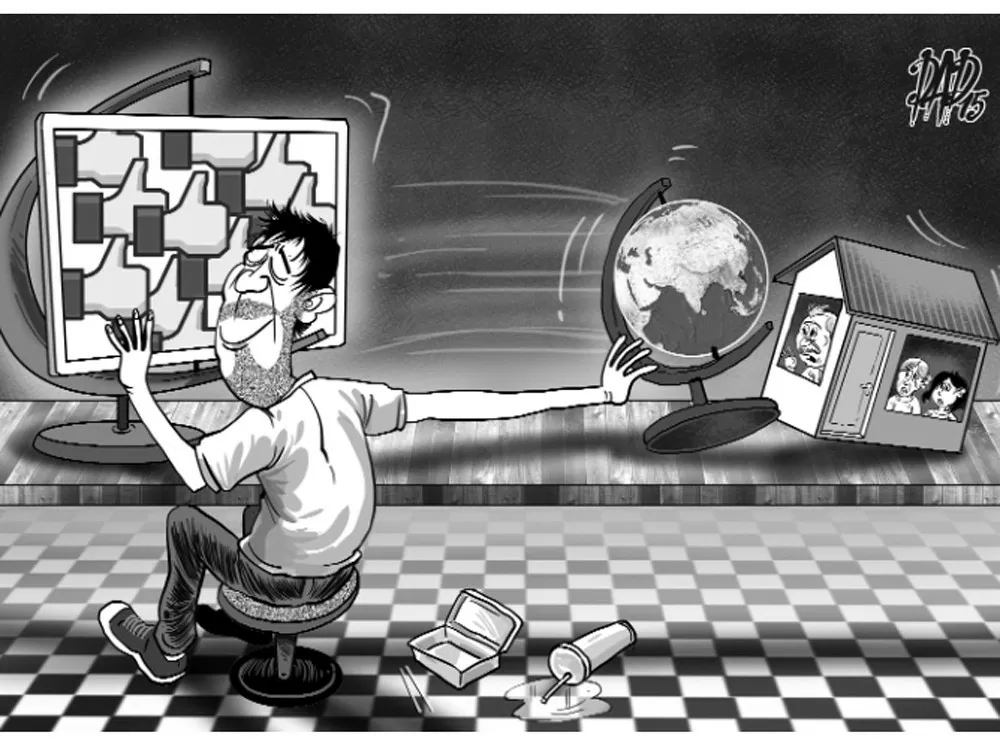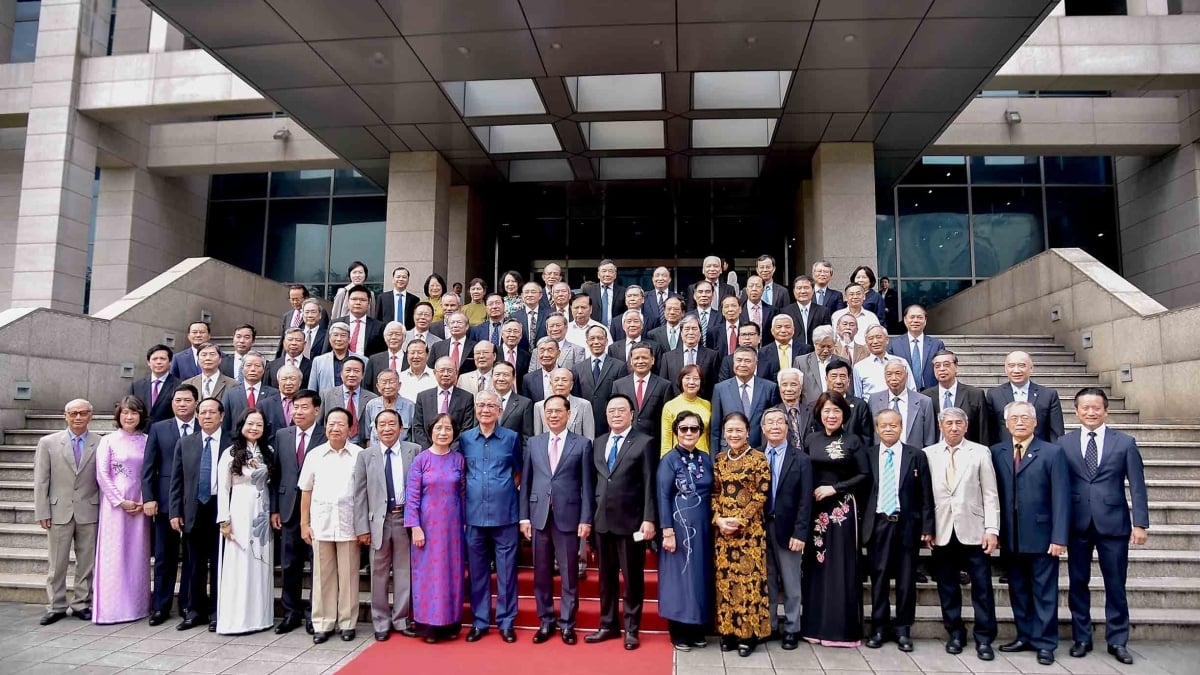According to Associate Professor, Dr. Pham Chien Thang, Head of the Faculty of Journalism and Communication, University of Science (Thai Nguyen University), in an environment that is rapidly developing in both economy and digital technology, young people are easily caught up in the vortex of glitz in a "canvas" way as a criterion to assert themselves and not fall behind.
 |
| Associate Professor, Dr. Pham Chien Thang believes that young people are easily drawn into a ostentatious, virtual lifestyle. (Photo: NVCC) |
"Canvas" to affirm self-worth
What do you think about the "canvas" lifestyle of some young people today? What is the difference between expressing yourself on social media and a "canvas" lifestyle, sir?
Living a "fake" life is no longer a strange issue among today's youth. In many cases, young people consider having to show off as an important thing they must do when participating in activities on social networking platforms, or participating in community activities in daily life.
In a rapidly developing environment both economically and socially like our country today, young people are easily caught up in the whirlwind of glitz and glamour as a criterion to assert themselves and not fall behind.
Although social media self-presentation and lifestyle are both related to how an individual provides information or images about themselves on this platform, however, in terms of purpose and nature, they still have certain differences. Social media self-presentation is valuable in building a personal brand, based on their authentic values such as interests, achievements, habits, etc. In addition, it is also to maintain connections with family, friends or the community they care about.
On the contrary, "posturing" on social networks aims to create flashy, lavish, exaggerated images to seek recognition, admiration or hide the truth even though the reality is not like that, this is a way to do anything to become famous.
However, to accurately distinguish between self-expression and “fabrication”, we must consider the motive of the information provided, especially the authenticity and truthfulness of the content of that information. Excessive self-expression is sometimes considered as pretentiousness, even though the information is true, but it is exaggerated to seek some benefit.
What factors promote the emergence and development of the canvas lifestyle among young people? Is it due to social pressure, media influence or other reasons?
In a rapidly developing society, pressure is not only for adults, even young people have to endure many different pressures to keep up with this development. Pressure comes from family, school and society, parents want their children to achieve many achievements, schools want students to be excellent, society needs successful people to promote development. This is what makes many young people fall into the pressure of expectations, they are compared with those around them, they also want to be recognized.
From there, they are not willing to accept their inner flaws and find ways to cover them up, only "showing" the good sides, or if they don't have any, they do everything to make it look good in the eyes of others. In psychology, this problem belongs to the feeling of inferiority of the individual, when they lack confidence in themselves, creating a "canvas" image is a way to compensate and express themselves.
In addition, in the context of economic globalization today, new economic forms such as e-commerce, digital economy... have created rapid development opportunities for many young people who are quick to adapt to new technologies. The "lightning-fast" success of a group of outstanding young people today also causes the remaining group to seek ways to "race" with the goal of having to succeed quickly as a criterion to affirm their own value.
During adolescence, the need for peer group acceptance is strong. As a result, when the environment emphasizes glamour, young people may feel pressured to “fit in” to fit in and be accepted. In addition, the influence of social media platforms today also contributes to the condition for this lifestyle to become more popular and frequent. Likes, compliments, and praise on social media act as a factor that produces stronger behavior.
From the perspective of behavioral social science , if a behavior is positively reinforced, the likelihood of repeating that behavior increases. In this case, the praise or admiration of the online community further reinforces and maintains the “poster” behavior.
Finally, the lack of education on life values is a core reason. Without guidance on life values, young people are easily drawn into evaluating themselves based on material things and external appearances, leading to “fake” behavior. This problem can come from a lack of family attention, a lack of soft skills courses in schools, or being influenced by harmful information on the Internet.
 |
| The “canvas” lifestyle causes many negative impacts on individuals and society. (Source: DAD) |
Education shapes life values, avoids negative trends
What negative impacts does this lifestyle have on young individuals and society? What psychological, social and moral consequences can it lead to?
It can be said that the “canvas” lifestyle causes many negative impacts on individuals and society. For individuals, those who pursue this lifestyle often face stress, anxiety, and even depression due to the pressure to maintain a flashy image. In real life, this pressure makes individuals lose true comfort and happiness.
Additionally, they may find it difficult to spend beyond their means to maintain a lavish appearance, leading to debt and loss of financial control. Furthermore, when the truth is exposed, they are likely to lose the trust of friends, family, and colleagues, damaging social relationships.
For society, this lifestyle reduces the belief in true values, or makes it difficult to distinguish between real and fake. When many people pursue virtual values, relationships in society become insincere and fake, and these relationships will not bring sustainable values.
This can lead to a social environment where dishonesty is widespread, negatively affecting community cohesion and trust in others. For example, when generosity is exploited to build personal image, the genuine value of helping efforts is significantly reduced, damaging the spirit of sharing and sincerity in society.
In education, this lifestyle reflects a lack of honesty and disregard for core values, and a departure from the ethical standards learned in school. The goal of training people who are both “talented” and “virtuous” to contribute to the development of the country is facing enormous challenges, and the traditional method of teaching knowledge has revealed many limitations. This requires families and schools to actively cooperate to educate students to appreciate true values, live true to themselves, and respect ethical standards.
In the age of social media, how can we distinguish between real and virtual values? What advice do you have for young people to avoid being caught up in the illusions of social media?
On social networking platforms, where anonymity and fake news in information content still exist, distinguishing between real and virtual values is not simple. To distinguish these values, it is necessary to evaluate the authenticity of the information source, the reliability and legitimacy of the person sharing the information. To be more careful, you can look for detailed information, such as personal history, family background, work, etc. of the information provider to evaluate the accuracy of the information content they share. In many cases, for influential information, it is advisable to compare it with official sources of information to avoid being caught up in the vortex of fake news and false information.
To avoid being caught up in virtual values on social networks, young people should raise awareness of the negative impacts of "fake" and virtual living, and should participate in social activities to see society in a realistic way.
In addition, learning how to use social media responsibly, identifying the advantages and disadvantages as well as the negative impacts of this media platform is also extremely important. It is important to enhance self-awareness, develop critical thinking, and help you know how to evaluate information objectively.
So what role does education play in shaping the values and lifestyles of young people? What should parents and schools do to help students have a correct view of life and avoid a life of excess, in your opinion?
Education plays a key role in shaping the values and lifestyle of young people, helping them develop their personalities and have a correct perception of themselves and society. Through education, students are equipped with the necessary knowledge, skills and moral values, thereby building a healthy lifestyle and avoiding negative trends.
Parents setting an example and schools educating will be the perfect combination to promote the comprehensive development of young people. Families and schools must go together in this process. Because the care from the family, the guidance from parents, the education from the school and extracurricular activities will help young people balance between the virtual and real worlds. From there, help them stay away from negative influences and not be dependent on social networking platforms, thereby, not being caught up in the trend of living "canvas".
Thank you!
Source

























![[Photo] National Assembly Chairman attends the seminar "Building and operating an international financial center and recommendations for Vietnam"](https://vphoto.vietnam.vn/thumb/1200x675/vietnam/resource/IMAGE/2025/7/28/76393436936e457db31ec84433289f72)











































































Comment (0)